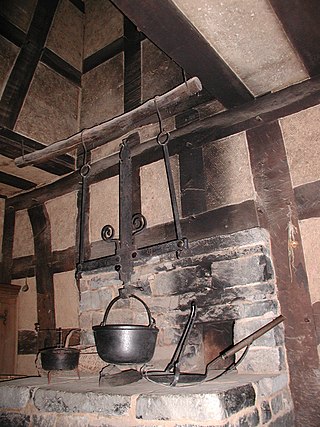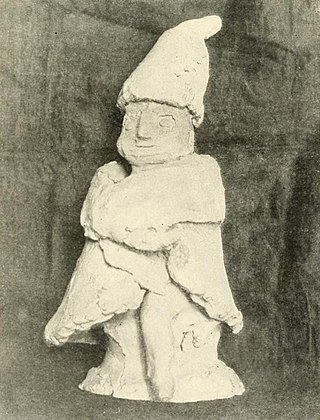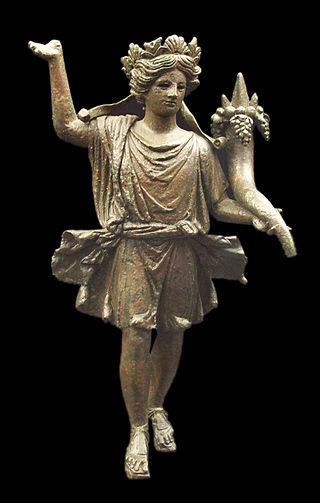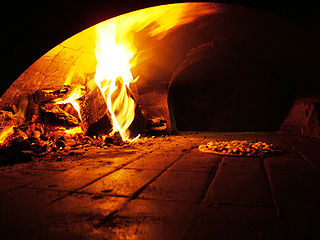
Agdistis is a deity of Greek, Roman, and Anatolian mythology who was a Hermaphrodite, having been born with both male and female reproductive organs. The deity was closely associated with the Phrygian goddess Cybele.
Mellona or Mellonia was an ancient Roman goddess said by St. Augustine to promote the supply of honey as Pomona did for apples and Bubona for cattle. Arnobius describes her as "a goddess important and powerful regarding bees, taking care of and protecting the sweetness of honey."

A hearth is the place in a home where a fire is or was traditionally kept for home heating and for cooking, usually constituted by at least a horizontal hearthstone and often enclosed to varying degrees by any combination of reredos, fireplace, oven, smoke hood, or chimney. Hearths are usually composed of masonry such as brick or stone. For millennia, the hearth was such an integral part of a home, usually its central and most important feature, that the concept has been generalized to refer to a homeplace or household, as in the terms "hearth and home" and "keep the home fires burning". In the modern era, since the advent of central heating, hearths are usually less central to most people's daily life because the heating of the home is instead done by a furnace or a heating stove, and cooking is instead done with a kitchen stove/range alongside other home appliances; thus many homes built in the 20th and 21st centuries do not have hearths. Nonetheless, many homes still have hearths, which still help serve the purposes of warmth, cooking, and comfort.

An oven is a tool which is used to expose materials to a hot environment. Ovens contain a hollow chamber and provide a means of heating the chamber in a controlled way. In use since antiquity, they have been used to accomplish a wide variety of tasks requiring controlled heating. Because they are used for a variety of purposes, there are many different types of ovens. These types differ depending on their intended purpose and based upon how they generate heat.

The Ancient Greek: δαίμων, pronounced daimon or daemon, originally referred to a lesser deity or guiding spirit such as the daimons of ancient Greek religion and mythology and of later Hellenistic religion and philosophy. The word is derived from Proto-Indo-European daimon "provider, divider ," from the root *da- "to divide". Daimons were possibly seen as the souls of men of the golden age acting as tutelary deities, according to entry δαίμων at Liddell & Scott. See also daimonic: a religious, philosophical, literary and psychological concept.

Juno was an ancient Roman goddess, the protector and special counsellor of the state. She was equated to Hera, queen of the gods in Greek mythology and a goddess of love and marriage. A daughter of Saturn and Ops, she was the sister and wife of Jupiter and the mother of Mars, Vulcan, Bellona, Lucina and Juventas. Like Hera, her sacred animal was the peacock. Her Etruscan counterpart was Uni, and she was said to also watch over the women of Rome. As the patron goddess of Rome and the Roman Empire, Juno was called Regina ("Queen") and was a member of the Capitoline Triad, centered on the Capitoline Hill in Rome, and also including Jupiter, and Minerva, goddess of wisdom.

A household deity is a deity or spirit that protects the home, looking after the entire household or certain key members. It has been a common belief in paganism as well as in folklore across many parts of the world.

Caelus or Coelus was a primordial god of the sky in Roman mythology and theology, iconography, and literature. The deity's name usually appears in masculine grammatical form when he is conceived of as a male generative force.

Lares were guardian deities in ancient Roman religion. Their origin is uncertain; they may have been hero-ancestors, guardians of the hearth, fields, boundaries, or fruitfulness, or an amalgam of these.

A masonry oven, colloquially known as a brick oven or stone oven, is an oven consisting of a baking chamber made of fireproof brick, concrete, stone, clay, or cob. Though traditionally wood-fired, coal-fired ovens were common in the 19th century, and modern masonry ovens are often fired with natural gas or even electricity. Modern masonry ovens are closely associated with artisan bread and pizza, but in the past they were used for any cooking task involving baking. Masonry ovens are built by masons.
The Fornacalia was an Ancient Roman religious festival celebrated in honor of the goddess Fornax, a divine personification of the oven (fornax), and was related to the proper baking of bread.

Vulcan is the god of fire including the fire of volcanoes, deserts, metalworking and the forge in ancient Roman religion and myth. He is often depicted with a blacksmith's hammer. The Vulcanalia was the annual festival held August 23 in his honor. His Greek counterpart is Hephaestus, the god of fire and smithery. In Etruscan religion, he is identified with Sethlans.

Nenia Dea was an ancient funeral deity of Rome, who had a sanctuary outside the Porta Viminalis. The cult of Nenia is doubtlessly a very old one, but according to Georg Wissowa the location of Nenia's shrine (sacellum) outside the center of early Rome indicates that she didn't belong to the earliest circle of Roman deities. In a different interpretation her shrine was located outside the old city walls, because it had been the custom for all gods connected to death or dying.

In ancient Roman religion, the Flamen Quirinalis was the flamen or high priest of the god Quirinus. He was one of the three flamines maiores, third in order of importance after the Flamen Dialis and the Flamen Martialis. Like the other two high priests, he was subject to numerous ritual taboos, such as not being allowed to touch metal, ride a horse, or spend the night outside Rome. His wife functioned as an assistant priestess with the title Flaminicia Quirinalis.

In ancient Roman religion, Mutunus Tutunus or Mutinus Titinus was a phallic marriage deity, in some respects equated with Priapus. His shrine was located on the Velian Hill, supposedly since the founding of Rome, until the 1st century BC.

In ancient Roman religion, the indigitamenta were lists of deities kept by the College of Pontiffs to assure that the correct divine names were invoked for public prayers. These lists or books probably described the nature of the various deities who might be called on under particular circumstances, with specifics about the sequence of invocation. The earliest indigitamenta, like many other aspects of Roman religion, were attributed to Numa Pompilius, second king of Rome.














